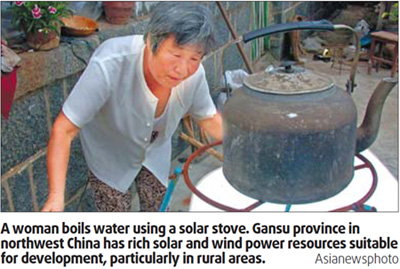


For years Ran Juying cooked meals over a wood fire that provided the fuel crucial to her daily survival, but gathering wood was arduous and smoke from the fire not only made her eyes water, it sent untold amounts of pollution into the atmosphere.
Today she is preparing meals and hot water in entirely new ways using a solar stove and a biogas system in her home.
Daping village where Ran lives is in Dingxi county, an hour's drive from Lanzhou, capital of Gansu province, where the 123 households and 581 people plant potatoes for a living on 2,700 mu - about 180 hectares - of barren land.
Like Ran, every resident of the village now enjoys the benefits of clean and abundant energy as a result of policies from the central and provincial governments to develop alternative energy sources in rural areas.
Shi Jun, vice-governor of Gansu, says 60 percent of the province's rural residents now have access to clean energy sources, with 460,000 households using biogas and 788,000 families cooking on solar stoves. The effort eliminates use of 264,000 tons of coal and reduces CO2 emissions by 470,000 tons each year.
Gansu accounts for 47 percent of solar stove sales in China, with the widespread use partly due to plentiful sunshine, but more importantly because of the province's dearth of energy resources.
For decades farmers used sod, grass roots and branches as fuel, which further damaged the local ecosystem, burning bushes that are precious in the arid mountain region.
Each solar stove is estimated to save from 600 to 1,000 kg of wood annually, according to a recent report for the United Nations Framework Convention on Climate Change.
The report says that solar stoves need to be used at least four hours a day to meet the daily cooking and water heating needs of a typical family, so monthly use is about 120 hours.
The stoves are made from a concave concrete shell lined with small mirrors that reflect and focus sunlight on a cooking vessel supported by grill above the reflectors.
"With a solar stove, villagers do not need to spend time collecting sticks or wood to boil water," said Kang Yaowei, head of Daping village.
He said the village government sends people to be trained how to build and maintain a biogas pool, who then teach villagers.
"The technical people came to my house to showed me how to build and use the biogas system," said Gao Xiuqin, who has now used the fuel source for two years.
"I can save 2,000 yuan each year by using biogas and a solar stove. I now use straw that was before used in fires to feed our animals. That also saves money. "
In 2002 the central government established a 1.2 billion yuan treasury bond fund to pay for wider use of biogas in rural areas. Each household in northwest China gets 1,200 yuan from the fund annually, with families in impoverished Gansu receiving 1,500 yuan.
Most of the subsidy comes from the central government bond fund, but this year the Gansu provincial government added 84 million yuan to accelerate the use of rural biogas, said Sun.
The cost of the whole biogas package for each household is about 3,500 yuan, mostly in construction costs to adapt animal pens, bathrooms and kitchens.
"The switch from burning organic material to using biogas and solar stoves creates a sustainable supply of energy for the countryside, reduces the pressure on the ecological system and saves farmers precious cash," said Sun.
(China Daily 06/15/2009 page3)













